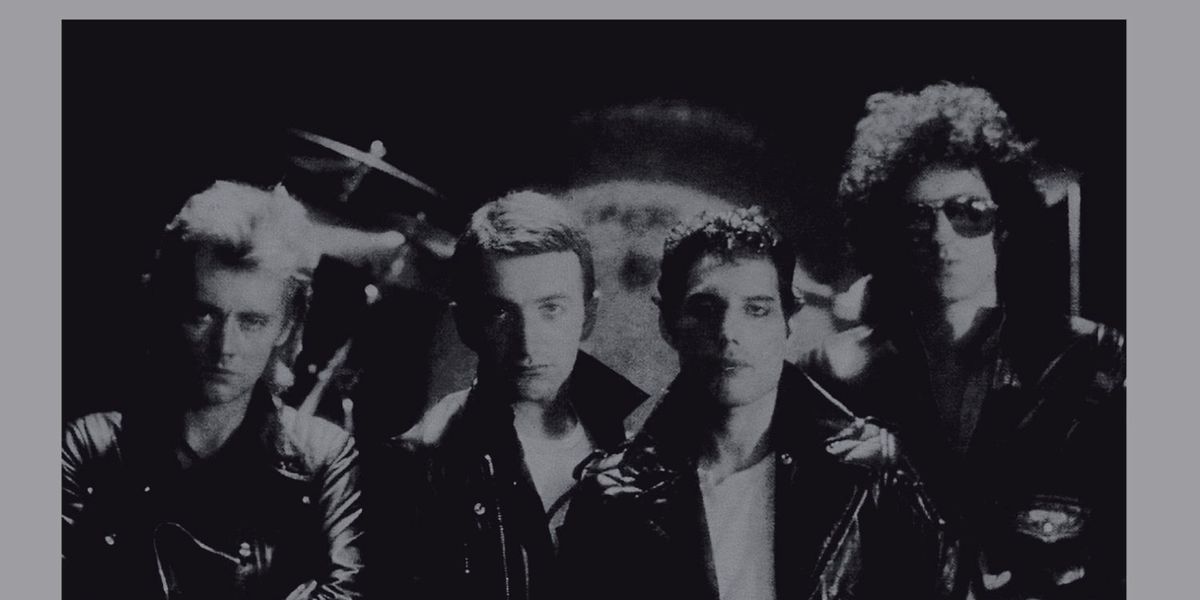In the liner notes for The Game, Queen’s eighth studio album and their first release of the 1980s, there’s a sentence that may seem unimportant to casual Queen fans but was borderline sacrilege to many of the die-hards. “This album includes the first appearance of a synthesizer (an Oberheim OBX) on a Queen album.” After seven successful years of recording and touring with the basic four-piece instrumentation of guitar, piano, bass, and drums, Queen finally acquiesced to the mighty synth.
It may not seem like a big deal; in fact, it’s practically an inevitability. Queen were a band fond of studio tinkering, unconventional arrangements, and the occasional deployment of everything from harpsichord to a Japanese koto to a genuine George Formby ukulele-banjo. They were also a band that seemed to enjoy immersing in stylistic relevance, and a synth in their hands could do wonders for expansion of the band’s already sophisticated, multi-layered sound. But for Queen, eschewing synths was something they seemed to wear like a badge of honor.
Previous albums included disclaimers in their liner notes along the lines of “No synths!” or the mildly arrogant “…and nobody played the synthesizer”. Never mind the fact that “Get Down, Make Love”, vocalist and pianist Freddie Mercury’s erotic disco/noise freak-out from the 1977 album News of the World used enough computerized audio effects devices (particularly an Eventide Harmonizer) to choke a horse. The bottom line is that while the news of synths on a Queen album may have come as a mild shock, it honestly didn’t completely transform the sound of the band.
In fact, while much has been made of the alleged stylistic corner Queen took with The Game, it really comes off more like a streamlined version of their previous studio album, Jazz (1978). That album retained many of the theatrical and progressive rock tendencies of their first few albums but also saw the band digging into contemporary pop and funk. The most obvious example is drummer Roger Taylor’s disco-flavored “Fun It”. Anyone familiar with that song — with its insistent dance rhythms and processed percussion — shouldn’t have been surprised by how The Game turned out. One could even look at “Fun It” as a template for The Game, which was recorded at Musicland Studios in Munich in 1979 and 1980 and co-produced by Reinhold Mack (who would later helm Billy Squier’s breakthrough album, Don’t Say No, the following year).
 Design Face Eye by Geralt (Pixabay License / Pixabay)
Design Face Eye by Geralt (Pixabay License / Pixabay)
The Game certainly takes advantage of the Oberheim OBX — most blatantly right off the bat on the opening track, “Play the Game”. Mercury’s mid-tempo ballad opens with what can only be described as the sound of a spaceship landing, almost as if to say, “Check it out! We got synths now, people!” There are also moments throughout the song where the keyboard swoops in and out as if it’s an official demo track for the instrument. But it’s used relatively sparingly throughout the album. On Taylor’s bracing, driving “Rock It (Prime Jive)”, synths provide a good deal of the song’s melody.
Still, The Game is — among other things — an album with plenty of heavy guitar. Guitarist Brian May brings his considerable chops to songs like his own composition “Dragon Attack”, a slinky funk-rock workout with lots of solid riffs and stinging leads (at times reminiscent of the extended guitar workouts on “Brighton Rock” from 1974’s Sheer Heart Attack). The song also indulges bassist John Deacon’s love of soul music with sinewy, melodic bass runs, and Taylor’s brief drumline-influenced solo adds another interesting layer.
Deacon ended up devising the most surprising plot twist on The Game. His Chic-inspired disco song, “Another One Bites the Dust”, was a worldwide smash, giving the band their second US number-one pop hit (the first being Mercury’s rockabilly confection, “Crazy Little Thing Called Love”, also on this album). The song even reached the upper ranks of the US soul singles chart — a seemingly inconceivable feat for a band who wrote songs like “Fairy-Feller’s Master Stroke”, “Ogre Battle”, and “Great King Rat”. But while The Game is a streamlined, fat-trimmed version of Queen, the eclectic nature of the album — not unlike previous Queen albums — is impressive. In fact, “Another One Bites the Dust” is immediately followed by a completely different, Deacon-composed song. “Need Your Loving Tonight” is a power-pop gem typical of earlier Deacon songs like “Misfire”, “You and I”, and “If You Can’t Beat Them” — a clear indication that Queen had no interest in maintaining musical boundaries.
The sheer variety of The Game continues with “Crazy Little Thing Called Love”, a song that seems unusually placed on the album — a jaunty Elvis Presley soundalike in the middle of power chords and disco beats. Written by Mercury while lounging in his Munich hotel suite bath (which is probably the most Freddie Mercury way to write a song), the composition’s relative simplicity shows a band willing to try anything — from prog to metal to funk to doo-wop — without missing a step or coming off as contrived. Taylor even contributes a new-wave rave-up in the form of the propulsive, catchy “Coming Soon”, a song originally written for Jazz that proves the drummer had that first Cars album in his collection. May’s additional contributions fill in the ballad quotas with emotionally charged entries both tender (“Sail Away Sweet Sister”) and anthemic (“Save Me”).
In fact, the only time The Game ever takes a serious misstep is with Mercury’s tacky, ill-conceived “Don’t Try Suicide”. It’s a bit of minimalist funk-pop that sounds less like a fully-formed song and more like some strange anti-suicide community service requirement. It’s probably best known as the US B-side to “Another One Bites the Dust”, which is great news for people who generally ignore the flip side of singles.


